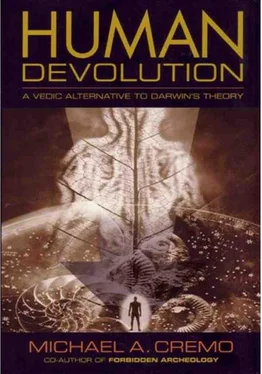Michael Cremo - Human Devolution - A Vedic Alternative To Darwin's Theory
Здесь есть возможность читать онлайн «Michael Cremo - Human Devolution - A Vedic Alternative To Darwin's Theory» весь текст электронной книги совершенно бесплатно (целиком полную версию без сокращений). В некоторых случаях можно слушать аудио, скачать через торрент в формате fb2 и присутствует краткое содержание. Год выпуска: 2003, ISBN: 2003, Издательство: Torchlight Publishing, Жанр: Старинная литература, на английском языке. Описание произведения, (предисловие) а так же отзывы посетителей доступны на портале библиотеки ЛибКат.
- Название:Human Devolution: A Vedic Alternative To Darwin's Theory
- Автор:
- Издательство:Torchlight Publishing
- Жанр:
- Год:2003
- ISBN:9780892133345
- Рейтинг книги:4 / 5. Голосов: 1
-
Избранное:Добавить в избранное
- Отзывы:
-
Ваша оценка:
- 80
- 1
- 2
- 3
- 4
- 5
Human Devolution: A Vedic Alternative To Darwin's Theory: краткое содержание, описание и аннотация
Предлагаем к чтению аннотацию, описание, краткое содержание или предисловие (зависит от того, что написал сам автор книги «Human Devolution: A Vedic Alternative To Darwin's Theory»). Если вы не нашли необходимую информацию о книге — напишите в комментариях, мы постараемся отыскать её.
Human Devolution: A Vedic Alternative To Darwin's Theory — читать онлайн бесплатно полную книгу (весь текст) целиком
Ниже представлен текст книги, разбитый по страницам. Система сохранения места последней прочитанной страницы, позволяет с удобством читать онлайн бесплатно книгу «Human Devolution: A Vedic Alternative To Darwin's Theory», без необходимости каждый раз заново искать на чём Вы остановились. Поставьте закладку, и сможете в любой момент перейти на страницу, на которой закончили чтение.
Интервал:
Закладка:
“‘I was a fish, and I shall be a crow,’ said Tancred to himself, when the hall door closed on him. ‘What a spiritual mistress! And yesterday, for a moment, I almost dreamed of kneeling with her at the Holy Sepulchre! I must get out of this city as quickly as possible.’”
Lady Constance presents the perfect picture of someone barely hanging on to “the faint-hearted faith of Europe, which is but the shadow of a shade” (Disraeli 1927, p. 441), all too ready to be swept aside by the new prophets of evolution. The unfriendly reception Disraeli got from the dons at Sheldon Theater in Oxford is proof of that. A world in which God, angels, and miracles have retreated beyond the most distant borders of material reality was ripe for rapid conquest by Huxley and Darwin.
But while in Syria, Tancred encountered a lady whose faith was anything but insipid; indeed, she manifested a faith in things too intensely mystical for even himself. The lady was Astarte, Queen of the Ansareys. Astarte took Tancred into a secret sanctuary cut out of solid rock in an isolated ravine. There he saw an “elegant hierarchy” composed of “goddess and god, genius, and nymph, and faun” (Disraeli 1927, p. 437). Tancred thought them to be the gods of the Greeks, but Astarte called them the gods of her own people, who once ruled from ancient Antioch. The chief goddess was Astarte, her own namesake.
“‘When all was over,’” said the Queen; “‘when the people refused to sacrifice, and the gods, indignant quitted earth, I hope not for ever, the faithful few fled to these mountains with the sacred images, and we have cherished them’” (Disraeli 1927, pp. 437–438). She expressed a lofty hope that “‘mankind will return again to those gods who made the earth beautiful and happy; and that they, in their celestial mercy, may revisit that world which, without them, has become a howling wilderness’” (Disraeli
1927, p. 438). If Disraeli’s vision of an active God and angels, voiced directly by himself and indirectly through characters like Tancred, is hostile to Darwinian evolution, how much more so the vision of Astarte?
Yet Astarte’s vision of a cosmos permeated with gods and goddesses once ruled Europe. These gods and goddesses were intimately involved in a temporal process of bringing into being other creatures within the universe. The universe was like a living mystical factory filled with subtle machinery, operated by subtle beings, who cooperated in the production of plants, humans, and animals. Then came Christianity. At first, Christianity simply replaced the pagan gods and goddesses with angels. But by gradually deemphasizing the role of angels, Christianity depopulated the cosmos. The visible universe became a lifeless clocklike machine that a distant creator God mysteriously built and set in motion. As far as living things were concerned, they were also machines. Mechanistic science took the final step of removing the mystery of their manufacture. They were not the instantaneous ex nihilo creations of the distant clockmaker, but part of a temporal material process running within the machine of the universe itself. That temporal process was evolution, guided by natural selection. In the universal scheme of life, the great clockmaker became a barely tolerated supernumerary, useful only for maintaining social order and public morality.
So man was ape, not angel. Nevertheless, there are still a great many people who take Disraeli’s side of the great question. For example, on July 13, 1994, Naomi Albright, author of several books about her contacts with angels, related to me this encounter: “I had entered into a state of consciousness that I call ‘living vision.’ A living vision is not like something imagined. It is perfectly clear to you that you are there live and in person. In this state, an angelic being appeared before me. He said I should call him ‘Lighter than Light,’ as his real name would be unpronounceable by me. After identifying himself as an angel, he told me that I should accept the fact that I had been one of them, an angel, since the Beginning, but that I had come down to the human form, and had been reincarnating on this level for a long time.” Experiences such as this point back to the cosmos of Disraeli, with its God and angels, its gods and goddesses, all somehow linked to human origins and destinies. Cultural anthropologists might call Albright’s “living vision” and angel encounter “an altered state of consciousness (ASC).” Such ASC reports are widespread. Anthropologist E. Bourguignon (1973, p. 9) surveyed 488 world cultures and found that 90 percent of them have welldeveloped experiences of such altered states. These would include, for example, the experiences reported by shamans, who regularly contact spirit beings in their trances. Albright’s angel-contact testimony shows, however, that ASCs are not confined to tribal peoples. Modern accounts of contacts with alien beings in connection with UFO experiences provide another example of ASCs from advanced cultures.
Many cultural anthropologists and clinical psychologists studying ASCs in non-Western cultures classify them as psychopathological—as neurotic or psychotic departures from normal consciousness, as defined by Western psychology (Price-Williams and Hughes 1994, pp. 4–5). A more charitable approach dispenses with Western psychopathological interpretations and evaluates ASCs as normal or abnormal according to the standards of the culture in which the states occur. In modern civilized societies, persons claiming to be in contact with a spirit being, and acting as if this were so, would be labeled psychotic. But in many other societies such claims and behavior would be considered normal, perhaps even prestigious. Nevertheless, most psychologists and anthropologists, although dispensing with negative descriptive language, would not normally regard a contact with an angel, spirit, or UFO entity as real, in the sense of the human subject actually contacting another existing personality. At most, those taking a Jungian point of view would say that there is contact with a real archetype from the human subconscious.
But some anthropologists are now considering a different approach. Katherine P. Ewing, a professor of cultural anthropology at Duke University, has raised the issue of positive belief as a valid stance for an anthropologist to take in relation to reports of paranormal phenomena. While engaged in researching Sufis in Pakistan, Ewing met a Sufi saint. This saint told her that he would come to her while she was sleeping. When this in fact occurred, in what Ewing took to be a dream, she felt someone touch her. The sensation was so real that, startled, she awoke sitting upright on her bed. In order to maintain her self-image as a professional anthropologist, she resisted what she called “the temptation to believe.” She found herself instinctively “placing the phenomenon immediately within a psychological interpretive scheme in which dreams come only from the dreamer’s internal states” (Ewing 1994, p. 574). In other words, she convinced herself that the saint had not actually come to her in the dream. But she noted, “To rule out the possibility of belief in another’s reality is to encapsulate that reality and thus, to impose the hegemony of one’s own view of the world” (Ewing 1994, p. 572). A better approach to experiences that challenge the worldview of Western science would be to “take them seriously and allow them to play a role in shaping what are ultimate realities we share as participants in a global human community” (Ewing 1994, p. 579).
When this step is taken, we find ourselves confronted with a wealth of empirical evidence that tends to support the worldviews of traditional cultures. When this evidence is taken into account, it would appear that human beings are not modified apes who arose on this planet by a process of physical evolution. Instead we are fallen angels, beings who came to this planet by a process of devolution from spiritual forms that preexisted in another dimension of reality.
Читать дальшеИнтервал:
Закладка:
Похожие книги на «Human Devolution: A Vedic Alternative To Darwin's Theory»
Представляем Вашему вниманию похожие книги на «Human Devolution: A Vedic Alternative To Darwin's Theory» списком для выбора. Мы отобрали схожую по названию и смыслу литературу в надежде предоставить читателям больше вариантов отыскать новые, интересные, ещё непрочитанные произведения.
Обсуждение, отзывы о книге «Human Devolution: A Vedic Alternative To Darwin's Theory» и просто собственные мнения читателей. Оставьте ваши комментарии, напишите, что Вы думаете о произведении, его смысле или главных героях. Укажите что конкретно понравилось, а что нет, и почему Вы так считаете.












